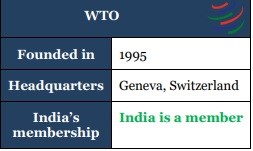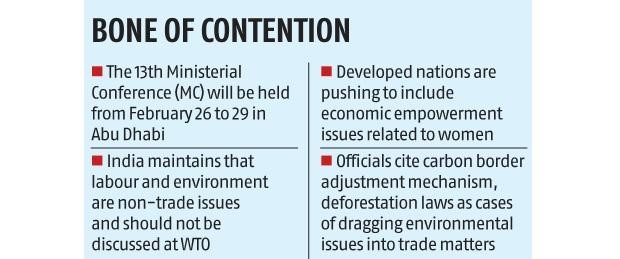|
Key areas
|
India’s stand
|
Issues
|
|
Food security
|
- India emphasizes the need for a permanent solution regarding its public stockholding program for food grains to ensure food security for large and vulnerable population.
- Public stockholding program is a policy tool under which the government procures crop like rice and wheat from farmers at a Minimum Support Price (MSP) and stores and distributes food grains to the poor.
- India has asked measures like amendment in the formula to calculate the food subsidy cap.
|
- WTO’s Agreement on Agriculture poses constraints on a government’s ability to purchase food at MSP.
- A WTO member country's food subsidy bill should not breach the limit of 10 per cent of the value of production based on the reference price of 1986-88.
- Developed nations are of the view that public stockholding program distort global trade prices of food grains.
|
|
Investment Facilitation for Development
|
- India opposes the proposal as it exceeds the mandate of the global trade body
- India emphasizes that investment related negotiations should occur outside the formal structure of WTO.
- India contends that this move would dilute the multilateral nature of WTO and violate the fundamental rule of consensus based decision making.
|
- The proposal is the effort of certain countries especially China, formally launched in 2020 which is backed by more than 100 countries.
- Investor State Dispute Settlement is a system through which individual companies can sue countries for alleged discriminatory practices.
|
|
Agricultural reforms
|
- India prioritizes safeguarding the livelihoods of its farmers.
- Measures such as MSP and public stockholding are crucial for ensuring food security and supporting vulnerable population
|
- Developed countries, however, focus on reducing domestic support and promoting market openness.
- Despite providing substantial subsidies to their wealthy farmers, they push for policies that may impact developing nations.
|
|
WTO reforms
|
- India seeks reforms to the WTO’s Appellate Body to ensure fairness.
- India opposes proposals from developed countries that aim to alter negotiation processes and integrate non-trade issues without consensus.
- India insists on preserving key pillars of WTO
- Special and differential treatment- Ensuring fair treatment for less developed and developing nations.
- Equal voice-Ensuring representation and participation for all members.
- Dispute settlement mechanism- Maintaining an effective resolution process.
|
- US, a frequent participant in WTO disputes, has been obstructing the process due to dissatisfaction with inefficiencies and perceived overreaches by the WTO's judiciary.
|
|
Fisheries subsidies
|
- India, as a low fisheries subsidizer, emphasizes that advanced fishing nations (which historically provided substantial subsidies) should bear more responsibility.
- The ‘polluter pay principle’ guides this approach, recognizing the impact of overfishing on fish stocks.
- Developing countries should be allowed to provide subsidies to their poor fishermen within exclusive economic zones (EEZs) or up to 200 nautical miles from the shore.
- Rich countries engaged in fishing beyond this zone should cease providing subsidies for the next 25 years.
|
- 12th Ministerial Conference- The subsidies will be prohibited for illegal, unreported and unregulated (IUU) fishing.
- WTO is negotiating to curb subsidies that contribute to overfishing and overcapacity to promote sustainable fishing.
|
|
Custom duties moratorium
|
- India along with other developing nations seeks the termination of this moratorium.
|
- The moratorium on custom duties for electronic transmission has been in place since 1998.
- Developed countries advocate for a permanent duty free flow of digital transmission.
|
|
Trade barrier
|
- India suggests addressing non-trade issues such as labour and environment should not be a part of WTO discussions.
- India suggests addressing these issues in different multilateral forums such as United Nations.
- India cautions against trade barriers like EU’s carbon tax and deforestation regulations, as it could hinder the global trade.
|
- European Union has proposed Carbon Border Adjustment Mechanism (CBAM) to impose 20-35% tariffs on imports of high-carbon goods like steel, iron ore and cement.
- EU regulations ban the import of products based on deforestation in the country of origin, likely to hit billions of dollars worth of exports from India.
|

